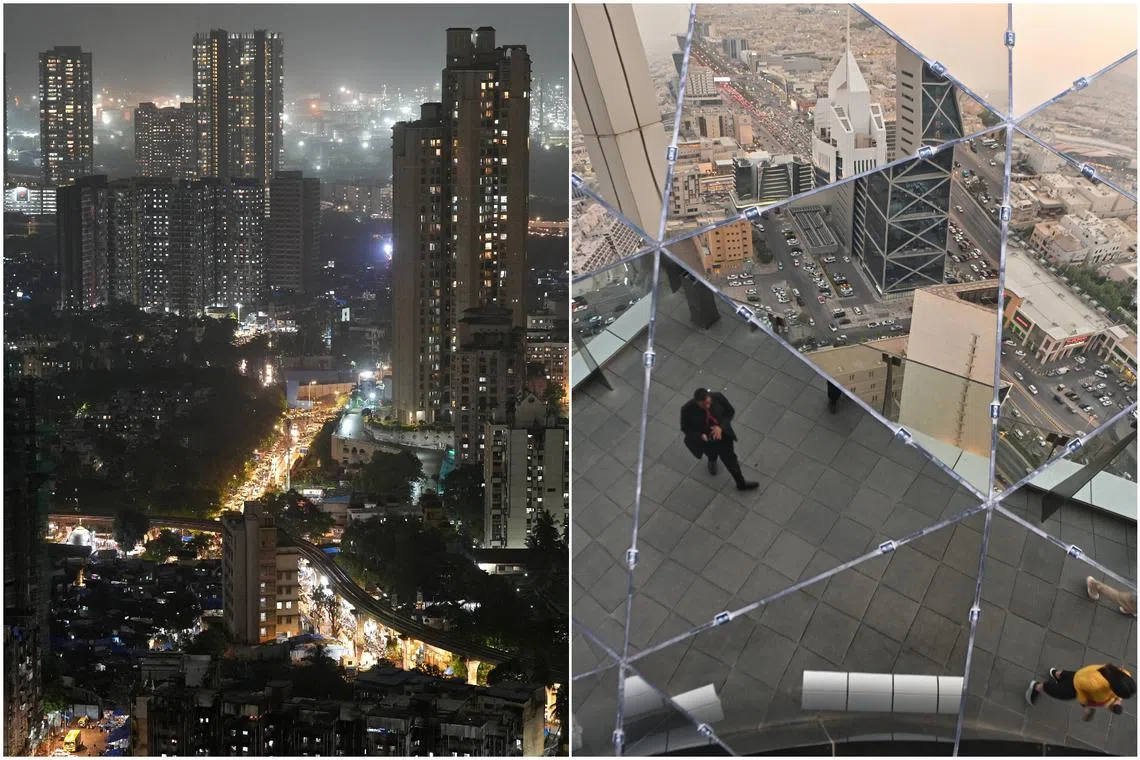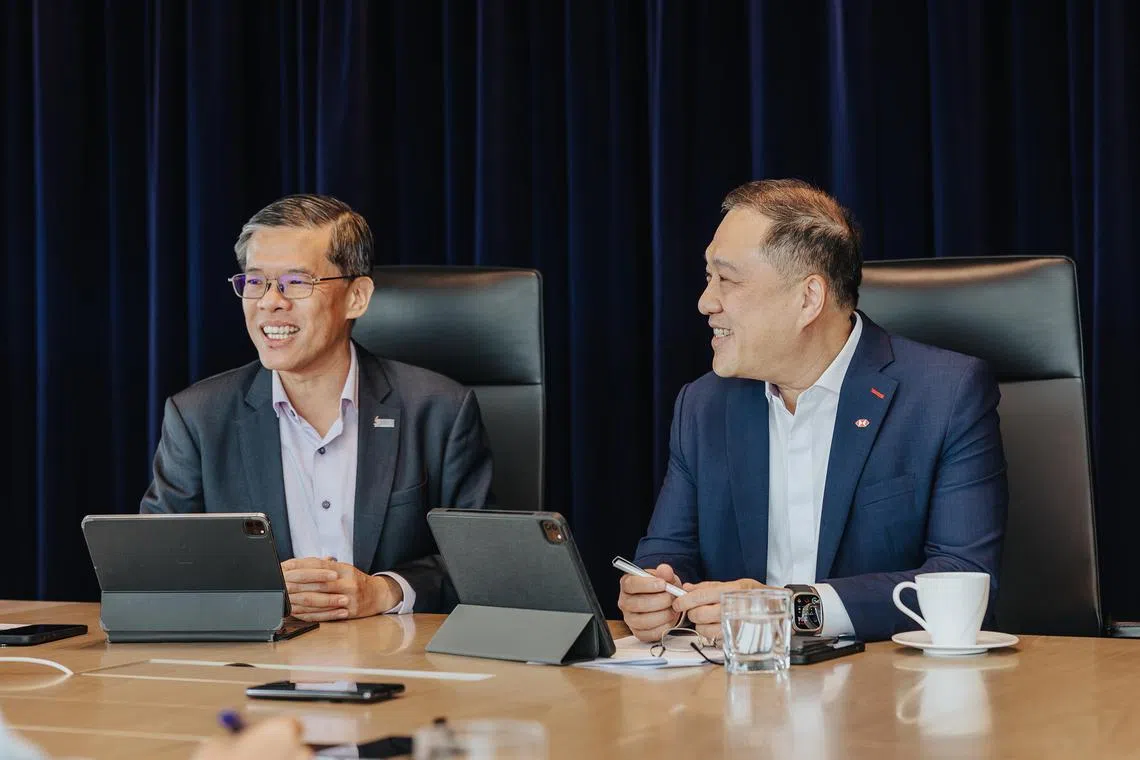Singapore firms eye under-tapped India and Middle East markets for overseas expansion
Sign up now: Get ST's newsletters delivered to your inbox

India and the Middle East represent a near-contiguous expanse of some of the world’s fastest-growing economies.
PHOTOS: REUTERS, ARIFFIN JAMAR
Follow topic:
SINGAPORE – As multinational corporations rush to diversify their international trade and investment exposure, Singapore companies planning to expand abroad are also increasingly looking at the burgeoning opportunities beyond Asean and China.
In response, the Singapore Business Federation (SBF) and HSBC have joined hands to support local businesses’ expansion overseas in key trade corridors, especially in under-tapped markets including India and the Middle East.
The idea is that companies here should cash in on Singapore’s long history of strong trade and diplomatic ties with India and countries in the Middle East before the first-mover advantage dries up.
Apart from the shifting supply chains and investment flows in response to geopolitical tensions and superpower rivalry in trade and technology, India and the Middle East represent a near-contiguous expanse of some of the world’s fastest-growing economies.
Representing about a quarter of the world’s population, India and the Middle East are also in the midst of an unprecedented drive to boost investment in urban development, transport, utilities, renewable energy, tourism, real estate, manufacturing and logistics.
Some of Singapore’s large enterprises have already moved in. But smaller companies, even if they have an attractive product to offer and have a good business plan, need help.
This was one of the salient points made during an interview with SBF chief executive officer Kok Ping Soon and HSBC Singapore CEO Wong Kee Joo.
Saudi Arabia, for example, plans to spend up to US$175 billion (S$228 billion) a year between 2025 and 2028 on greenfield industrial plants and giga-projects such as Neom, a megacity being built in a bay in the kingdom.
In real estate, it plans to build 660,000 new homes, 289,000 hotel rooms, 6 million sq m of office space and 5.3 million sq m of retail space.
“But Saudi Arabia is not exactly the easiest market for any company,” said Mr Kok, adding that India and most Middle Eastern economies are not as open as Singapore.
Saudi Arabia, under Crown Prince Mohammed bin Salman’s Vision 2030 – aimed at diversifying the economy away from oil, has taken many measures to foster a favourable business environment by streamlining and simplifying regulatory processes.
But at times, it can be difficult to navigate the complexities of some of the rules.
For instance, some 400 foreign companies have relocated their regional headquarters to the kingdom since 2021 when the Saudi government declared that it would stop working with international companies without a regional HQ there by 2024.
Mr Kok led a delegation of 32 high-level business representatives from 27 Singapore companies in the energy and sustainability, built environment, marine and offshore, healthcare, and technology sectors to Saudi Arabia and the United Arab Emirates, in conjunction with then Prime Minister Lee Hsien Loong’s official visit in October 2023
During the visit, SBF signed separate memorandums of understanding (MOUs) with the Ministry of Investment Saudi Arabia and the Federation of Saudi Chambers to deepen the bilateral relationship between the two countries and promote economic cooperation, trade and investment.
In line with the MOUs, the launch of a joint Saudi-Singapore Business Council was announced in September 2023.

Singapore Business Federation CEO Kok Ping Soon (left) and HSBC Singapore CEO Wong Kee Joo.
PHOTO: HSBC
Mr Kok said these initiatives will help facilitate investment by Singapore companies, especially the smaller ones.
“Many of the big companies would be able to penetrate most of these markets. We try to help the next tier of companies,” he said.
SBF plans to lead a delegation of Singapore companies to India from Sept 8 to 14 with a focus on the semiconductor sector, Mr Kok said.
While HSBC is also among the oldest Western banks in the Middle East, its origins in India date back to 1853 when the Mercantile Bank of India was established in Mumbai.
Today, with a gross domestic product of US$3.9 trillion, India is the world’s fifth-largest and fastest-growing major economy and is seen as the next Asian manufacturing powerhouse.
For HSBC, the country is one of its most profitable locations.
Mr Wong believes that apart from opportunities in manufacturing, logistics, real estate and other sectors, Singapore’s fintechs can make a mark in both India and the Middle East.
“Within India, what we are seeing today is a real transformation in terms of the digital economy.
“There is a digital boom which offers Singapore businesses, especially fintechs and start-ups, opportunities in areas such as payments, lending, investment and reinsurance,” he said.
Mr Wong said advanced manufacturing, semiconductors, aviation and maritime are other sectors in India where Singapore companies can find investment opportunities.
He said that being a bank, HSBC can help Singapore companies, especially start-ups, with any funding constraints and transactions in and out of the country. But, more importantly, HSBC can also give them access to local knowledge about how to deal with the government and partners in the new market.
He gave the example of Singapore-based tech start-up Crayon Data, which runs a centre of excellence in India from where its data, tech and engineering team works.
Credit support from HSBC has not only helped Crayon manage working capital needs but also accelerated its product development for new artificial intelligence use cases and products.
With HSBC’s funding support, Crayon recently launched a new product called CxO Concierge that allows C-level executives and business decision-makers to access real-time business insights.
The bank also gave Crayon access to its extensive network of key senior contacts and decision-makers in India that helped the company land new business.
In a phone interview from the Saudi capital of Riyadh, Ms Bell Beh, co-founder and CEO of tech start-up BuzzAR, said the company views support from HSBC’s New Economy Fund as pivotal to its expansion in the kingdom.
“HSBC provided BuzzAR with invaluable insights and assistance in setting up early operations,” she said.
BuzzAR develops AI-powered mini apps for governments and businesses to promote tourism and has a multimillion-dollar contract with the Saudi Tourism Authority. The company has developed comparable products for the Singapore Land Authority.
The company, which plans to expand across the Middle East and North Africa region, hopes to get more support from HSBC.
Correction note: In an earlier version of the story, we said that BuzzAR has developed AI-powered mini apps for the Singapore Tourism Board. BuzzAR has since clarified that it developed those apps for the Singapore Land Authority.


